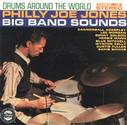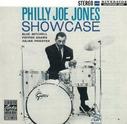Philly Joe Jones on Drums at the Jazznote
Joseph Rudolph Jones, aka Philly Joe Jones, was born July 15, 1923 in Philadelphia. To avoid being mistaken for Count Basie's drummer, Jo Jones, he dubbed himself "Philly Joe" after his hometown of Philadelphia. Starting his musical training at an early age, he was inspired by classic swing drummers such as Baby Dodds, Sid Catlett, and Chick Webb. After a stint in the army (1941-47) Jones moved to New York City where he became the house drummer at Cafe Society, playing with the emerging front guard of Bop jazz such as Dizzy Gillespie, Charlie Parker, and Fats Navarro, as well as working regularly with Ben Webster, Lionel Hampton and Joe Morris' rhythm-and-blues band which featured up-and-comers Johnny Griffin on tenor sax, Elmo Hope on piano, and Percy Heath on bass.
Early in the 1950s, Jones became one of the most sought-after of session drummers. He joined Duke Ellington's Orchestra in 1952, but he left to concentrate on studio work rather than touring. In 1953 he began what would be some formulative years with influential pianist/arranger Tadd Dameron (Jones formed Dameronia near the end of his career, dedicated to the music of his mentor).
In 1954, Jones began his association with Miles Davis that would propel him to the forefront of jazz drumming where he earned a reputation for volatile drumming and precise accompaniment. But Jones place in the classic Miles Davis Quintet would be short-lived; Davis fired Jones in 1958 because of Jones' heroin habit. Likewise, he was virtually blacklisted from the Prestige record label (by order of Bob Weinstock). But Jones kicked his habit and during the 1950s and 1960s recorded several albums as a leader and continued session work for other musicians, most notably on the Riverside label where he became the "house drummer".
On Sept. 17, 1958 Jones recorded his first album as leader, Blues for Dracula shortly after he left Miles Davis' Quintet. Following a drawn out Bela Lugosi-like dialogue on the title track, the album soon falls into pace with some fine playing from cornetist Nat Adderley, trombonist Julian Priester, the tenor Johnny Griffin, pianist Tommy Flanagan, bassist Jimmy Garrison. Highlights are Davis' "Tune-Up" and Dizzy Gillespie's "Ow". A fine session, but not essential.

 Drums Around the World: Philly Joe Jones Big Band Sounds (May 28-29, 1959) is true to its name with Jones handling some fine solo work (including an unaccompanied "The Tribal Message") . And then there's the "supporting" cast: trumpeter Lee Morgan and Blue Mitchell, trombonist Curtis Fuller, Herbie Mann on flute and piccolo, altoist Cannonball Adderley, Benny Golson on tenor, baritonist Sahib Shihab (recall his work on Coltrane's debut), pianist Wynton Kelly and either Sam Jones or Jimmy Garrison on bass. Intended as a showcase of "world music" the session waters down to hard bop. A must for drum lovers.
Drums Around the World: Philly Joe Jones Big Band Sounds (May 28-29, 1959) is true to its name with Jones handling some fine solo work (including an unaccompanied "The Tribal Message") . And then there's the "supporting" cast: trumpeter Lee Morgan and Blue Mitchell, trombonist Curtis Fuller, Herbie Mann on flute and piccolo, altoist Cannonball Adderley, Benny Golson on tenor, baritonist Sahib Shihab (recall his work on Coltrane's debut), pianist Wynton Kelly and either Sam Jones or Jimmy Garrison on bass. Intended as a showcase of "world music" the session waters down to hard bop. A must for drum lovers.

 Later that year, on November 17, 1959 Jones put together an impressive hard-bop lineup consisting of trumpeter Blue Mitchell, trombonist Julian Priester, tenor saxophonist Bill Barron, either Dolo Coker or Sonny Clark on piano, and bassist Jimmy Garrison. Of particular interest is "Gwen," a Jones ballad that has the leader on both piano and (via overdubbing) drums with bassist Jimmy Garrison--a two-man trio! Another highlight is Jones' feature on "Gone" (based on the Miles Davis/Gil Evans album "Porgy and Bess").
Later that year, on November 17, 1959 Jones put together an impressive hard-bop lineup consisting of trumpeter Blue Mitchell, trombonist Julian Priester, tenor saxophonist Bill Barron, either Dolo Coker or Sonny Clark on piano, and bassist Jimmy Garrison. Of particular interest is "Gwen," a Jones ballad that has the leader on both piano and (via overdubbing) drums with bassist Jimmy Garrison--a two-man trio! Another highlight is Jones' feature on "Gone" (based on the Miles Davis/Gil Evans album "Porgy and Bess").
Jones moved to London in 1967, then on to Paris after being prevented from playing according English union laws. He performed and recorded with various avant-garde players including Archie Shepp until 1972 when he returned to his native Philadelphia. There, he formed the fusion group Grand Prix, toured with Bill Evans during 1976, gigged extensively with former Davis bandmate, Red Garland, before paying tribute to his former mentor, Tadd Dameron, by leading the group Dameronia from 1981 until his death on August 30, 1985 at the age of 62.

HOME | TOP | ARTISTS

 Drums Around the World: Philly Joe Jones Big Band Sounds (May 28-29, 1959) is true to its name with Jones handling some fine solo work (including an unaccompanied "The Tribal Message") . And then there's the "supporting" cast: trumpeter Lee Morgan and Blue Mitchell, trombonist Curtis Fuller, Herbie Mann on flute and piccolo, altoist Cannonball Adderley, Benny Golson on tenor, baritonist Sahib Shihab (recall his work on Coltrane's debut), pianist Wynton Kelly and either Sam Jones or Jimmy Garrison on bass. Intended as a showcase of "world music" the session waters down to hard bop. A must for drum lovers.
Drums Around the World: Philly Joe Jones Big Band Sounds (May 28-29, 1959) is true to its name with Jones handling some fine solo work (including an unaccompanied "The Tribal Message") . And then there's the "supporting" cast: trumpeter Lee Morgan and Blue Mitchell, trombonist Curtis Fuller, Herbie Mann on flute and piccolo, altoist Cannonball Adderley, Benny Golson on tenor, baritonist Sahib Shihab (recall his work on Coltrane's debut), pianist Wynton Kelly and either Sam Jones or Jimmy Garrison on bass. Intended as a showcase of "world music" the session waters down to hard bop. A must for drum lovers.
